英语语法-形容词
- 格式:doc
- 大小:32.50 KB
- 文档页数:6

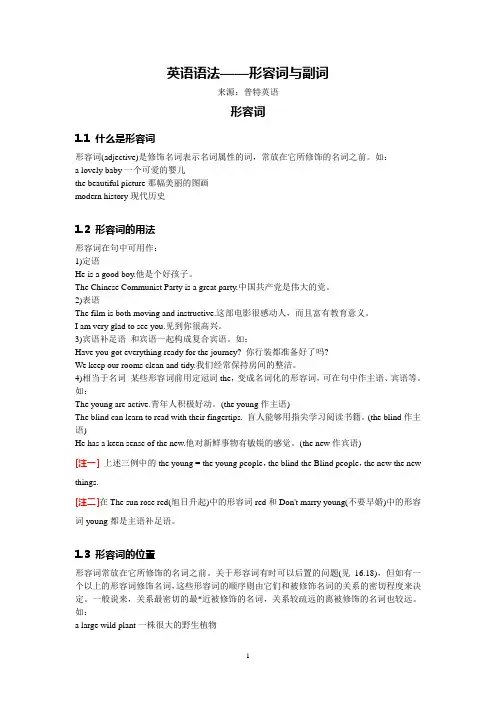
英语语法——形容词与副词来源:普特英语形容词1.1 什么是形容词形容词(adjective)是修饰名词表示名词属性的词,常放在它所修饰的名词之前。
如:a lovely baby一个可爱的婴儿the beautiful picture那幅美丽的图画modern history现代历史1.2 形容词的用法形容词在句中可用作:1)定语He is a good boy.他是个好孩子。
The Chinese Communist Party is a great party.中国共产党是伟大的党。
2)表语The film is both moving and instructive.这部电影很感动人,而且富有教育意义。
I am very glad to see you.见到你很高兴。
3)宾语补足语和宾语一起构成复合宾语。
如:Have you got everything ready for the journey? 你行装都准备好了吗?We keep our rooms clean and tidy.我们经常保持房间的整洁。
4)相当于名词某些形容词前用定冠词the,变成名词化的形容词,可在句中作主语、宾语等。
如:The young are active.青年人积极好动。
(the young作主语)The blind can learn to read with their fingertips. 盲人能够用指尖学习阅读书籍。
(the blind作主语)He has a keen sense of the new.他对新鲜事物有敏锐的感觉。
(the new作宾语)[注一]上述三例中的the young = the young people,the blind the Blind people,the new the new things.[注二]在The sun rose red(旭日升起)中的形容词red和Don't marry young(不要早婚)中的形容词young都是主语补足语。
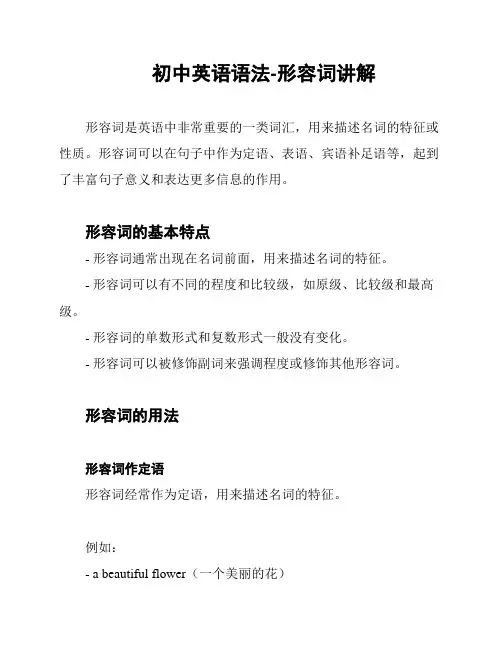
初中英语语法-形容词讲解形容词是英语中非常重要的一类词汇,用来描述名词的特征或性质。
形容词可以在句子中作为定语、表语、宾语补足语等,起到了丰富句子意义和表达更多信息的作用。
形容词的基本特点- 形容词通常出现在名词前面,用来描述名词的特征。
- 形容词可以有不同的程度和比较级,如原级、比较级和最高级。
- 形容词的单数形式和复数形式一般没有变化。
- 形容词可以被修饰副词来强调程度或修饰其他形容词。
形容词的用法形容词作定语形容词经常作为定语,用来描述名词的特征。
例如:- a beautiful flower(一个美丽的花)- the big house(大房子)形容词作表语形容词可以作为表语,用来说明主语的状态、特征或性质。
例如:- She is happy.(她很开心。
)- The car looks new.(这辆车看起来很新。
)形容词作宾语补足语形容词也可以作为宾语补足语,用来描述宾语。
例如:- I find the movie interesting.(我觉得这部电影很有趣。
)- They made him angry.(他们让他生气了。
)形容词的比较级和最高级形容词比较级形容词可以用来比较两个事物的程度或大小。
- 一般情况下,我们在形容词后面加上-er来表示比较级。
- 如果形容词以字母e结尾,只需加-r,不需要再加e。
- 如果形容词以辅音字母+y结尾,要将y变为i,再加-er。
- 有些形容词的比较级形式需要变化,如good(好)- better(更好)、bad(坏)- worse(更差)等。
例如:- This book is longer than that book.(这本书比那本书长。
)- She is taller than her sister.(她比她姐姐高。
)形容词最高级形容词可以用来表示三个或三个以上事物之间的最高程度或大小。
- 一般情况下,我们在形容词前面加上the和-est来表示最高级。
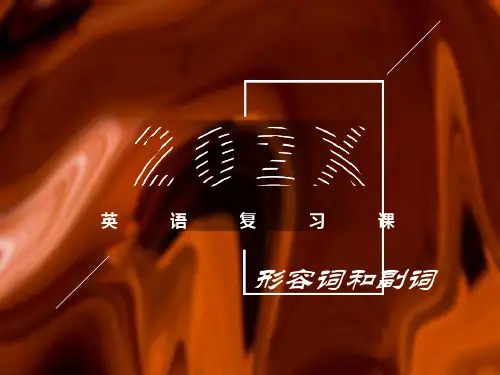
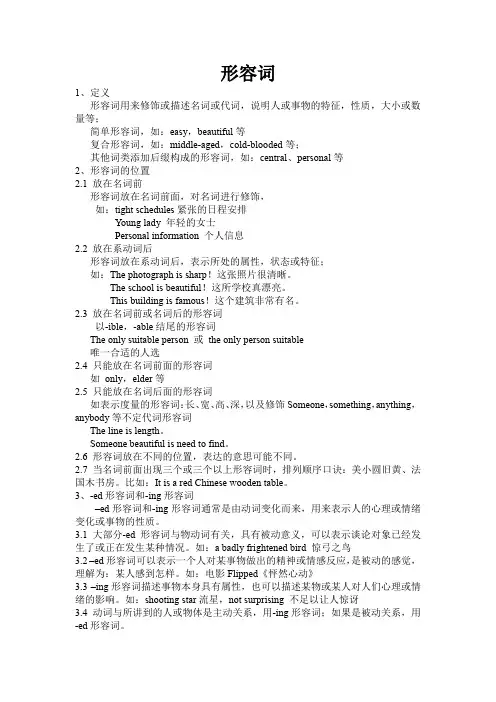
形容词1、定义形容词用来修饰或描述名词或代词,说明人或事物的特征,性质,大小或数量等;简单形容词,如:easy,beautiful等复合形容词,如:middle-aged,cold-blooded等;其他词类添加后缀构成的形容词,如:central、personal等2、形容词的位置2.1 放在名词前形容词放在名词前面,对名词进行修饰,如:tight schedules紧张的日程安排Young lady 年轻的女士Personal information 个人信息2.2 放在系动词后形容词放在系动词后,表示所处的属性,状态或特征;如:The photograph is sharp!这张照片很清晰。
The school is beautiful!这所学校真漂亮。
This building is famous!这个建筑非常有名。
2.3 放在名词前或名词后的形容词以-ible,-able结尾的形容词The only suitable person 或the only person suitable唯一合适的人选2.4 只能放在名词前面的形容词如only,elder等2.5 只能放在名词后面的形容词如表示度量的形容词:长、宽、高、深,以及修饰Someone,something,anything,anybody等不定代词形容词The line is length。
Someone beautiful is need to find。
2.6 形容词放在不同的位置,表达的意思可能不同。
2.7 当名词前面出现三个或三个以上形容词时,排列顺序口诀:美小圆旧黄、法国木书房。
比如:It is a red Chinese wooden table。
3、-ed形容词和-ing形容词–ed形容词和-ing形容词通常是由动词变化而来,用来表示人的心理或情绪变化或事物的性质。
3.1 大部分-ed形容词与物动词有关,具有被动意义,可以表示谈论对象已经发生了或正在发生某种情况。
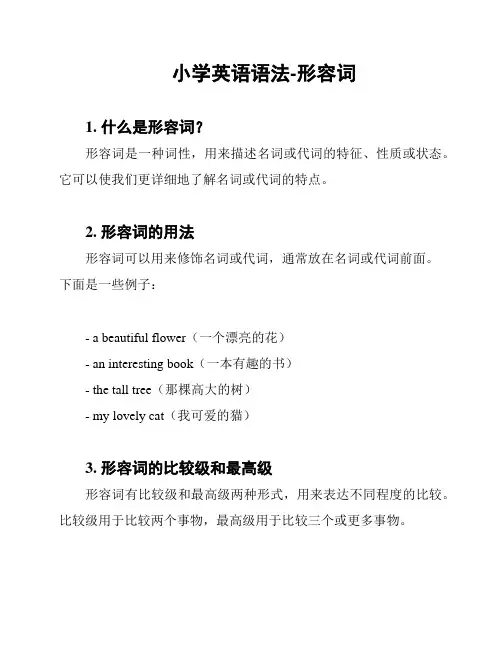
小学英语语法-形容词1. 什么是形容词?形容词是一种词性,用来描述名词或代词的特征、性质或状态。
它可以使我们更详细地了解名词或代词的特点。
2. 形容词的用法形容词可以用来修饰名词或代词,通常放在名词或代词前面。
下面是一些例子:- a beautiful flower(一个漂亮的花)- an interesting book(一本有趣的书)- the tall tree(那棵高大的树)- my lovely cat(我可爱的猫)3. 形容词的比较级和最高级形容词有比较级和最高级两种形式,用来表达不同程度的比较。
比较级用于比较两个事物,最高级用于比较三个或更多事物。
- 比较级的构成:形容词原形 + er,例如:taller(更高的),bigger(更大的)- 最高级的构成:形容词原形 + est,例如:tallest(最高的),biggest(最大的)下面是一些使用比较级和最高级的例子:- This book is more interesting than that one.(这本书比那本书更有趣。
)- This is the tallest building in the city.(这是这座城市最高的建筑。
)4. 形容词的修饰范围形容词不仅可以修饰名词或代词,还可以修饰整个句子。
这时,形容词通常放在句子的最前面,用来表达说话人的感受或观点。
下面是一些使用形容词修饰句子的例子:- Amazingly, he finished the race in record time.(令人惊讶的是,他以创纪录的时间完成了比赛。
)- Unfortunately, the concert was canceled due to bad weather.(不幸的是,由于天气不好,音乐会被取消了。
)5. 形容词的数量和位置当形容词用于修饰复数名词时,通常位于名词的前面,并在形容词和名词之间加上 "s"。
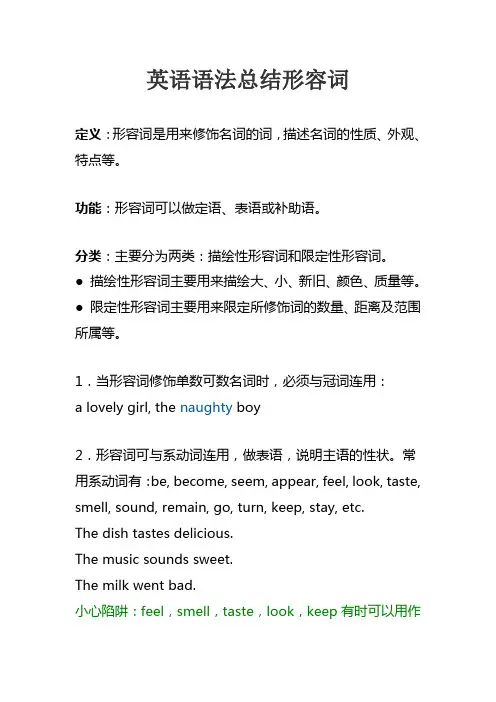
英语语法总结形容词定义:形容词是用来修饰名词的词,描述名词的性质、外观、特点等。
功能:形容词可以做定语、表语或补助语。
分类:主要分为两类:描绘性形容词和限定性形容词。
●描绘性形容词主要用来描绘大、小、新旧、颜色、质量等。
●限定性形容词主要用来限定所修饰词的数量、距离及范围所属等。
1.当形容词修饰单数可数名词时,必须与冠词连用:a lovely girl, the naughty boy2.形容词可与系动词连用,做表语,说明主语的性状。
常用系动词有:be, become, seem, appear, feel, look, taste, smell, sound, remain, go, turn, keep, stay, etc.The dish tastes delicious.The music sounds sweet.The milk went bad.小心陷阱:feel,smell,taste,look,keep有时可以用作实义动词,并可以用副词修饰。
He looked me up and down carefully.I tasted the soup slowly to see whether it was salty.3.形容词用作后置定语。
(简单理解:一般的形容词修饰名词时放在名词前面,但有些形容词修饰名词时放在名词的后面)a river navigable(一条可通航的河)sight visible (可见的景象)person responsible(负责人)注意:responsible person (有责任心的人)the best way possible(尽可能好的办法)the number necessary(必要的数量)the people present(在场的人)4.只能作表语的形容词(1) 某些表示健康状况的形容词。
well(身体好的),ill(病的),faint(虚弱的),poorly (身体不好的)示例:His mother has been ill for a long time.特别注意:sick是个特例。
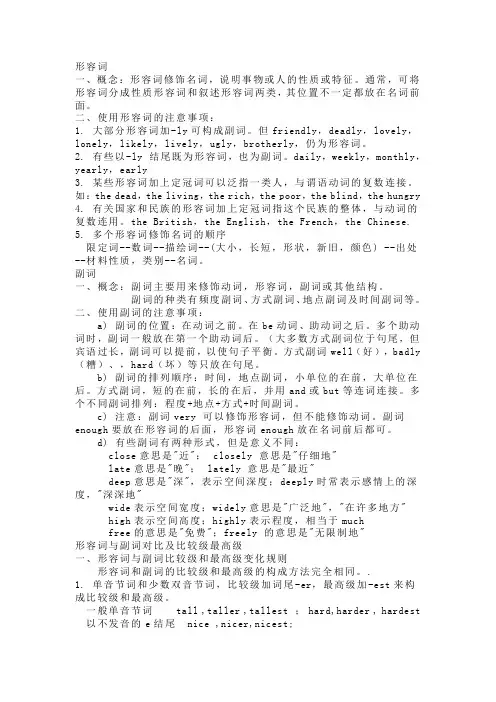
形容词一、概念:形容词修饰名词,说明事物或人的性质或特征。
通常,可将形容词分成性质形容词和叙述形容词两类,其位置不一定都放在名词前面。
二、使用形容词的注意事项:1. 大部分形容词加-ly可构成副词。
但friendly,deadly,lovely,lonely,likely,lively,ugly,brotherly,仍为形容词。
2. 有些以-ly 结尾既为形容词,也为副词。
daily,weekly,monthly,yearly,early3. 某些形容词加上定冠词可以泛指一类人,与谓语动词的复数连接。
如:the dead,the living,the rich,the poor,the blind,the hungry4. 有关国家和民族的形容词加上定冠词指这个民族的整体,与动词的复数连用。
the British,the English,the French,the Chinese.5. 多个形容词修饰名词的顺序限定词--数词--描绘词--(大小,长短,形状,新旧,颜色) --出处--材料性质,类别--名词。
副词一、概念:副词主要用来修饰动词,形容词,副词或其他结构。
副词的种类有频度副词、方式副词、地点副词及时间副词等。
二、使用副词的注意事项:a) 副词的位置:在动词之前。
在be动词、助动词之后。
多个助动词时,副词一般放在第一个助动词后。
(大多数方式副词位于句尾,但宾语过长,副词可以提前,以使句子平衡。
方式副词well(好),badly (糟)、,hard(坏)等只放在句尾。
b) 副词的排列顺序:时间,地点副词,小单位的在前,大单位在后。
方式副词,短的在前,长的在后,并用and或but等连词连接。
多个不同副词排列:程度+地点+方式+时间副词。
c) 注意:副词very 可以修饰形容词,但不能修饰动词。
副词enough要放在形容词的后面,形容词enough放在名词前后都可。
d) 有些副词有两种形式,但是意义不同:close意思是"近"; closely 意思是"仔细地"late意思是"晚"; lately 意思是"最近"deep意思是"深",表示空间深度;deeply时常表示感情上的深度,"深深地"wide表示空间宽度;widely意思是"广泛地","在许多地方"high表示空间高度;highly表示程度,相当于muchfree的意思是"免费";freely 的意思是"无限制地"形容词与副词对比及比较级最高级一、形容词与副词比较级和最高级变化规则形容词和副词的比较级和最高级的构成方法完全相同。
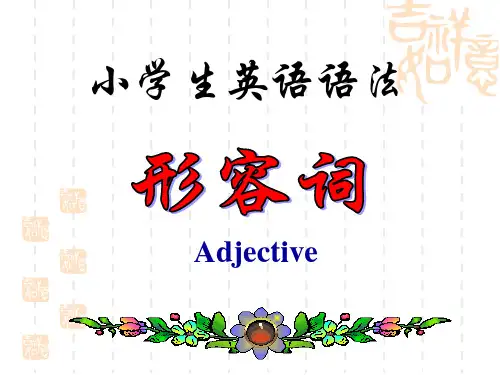
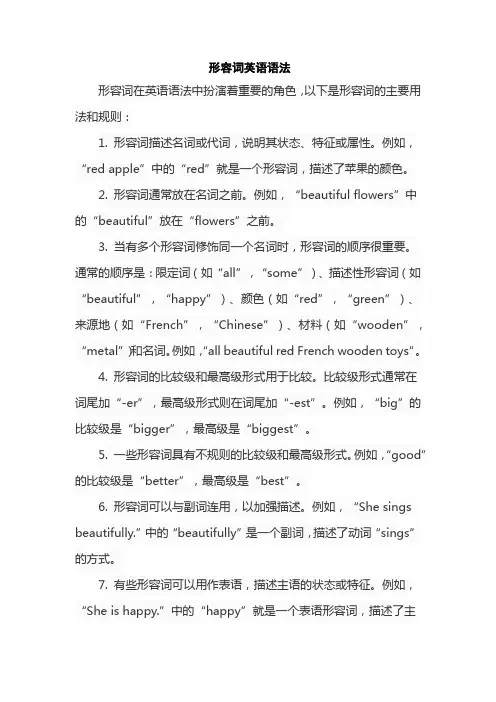
形容词英语语法形容词在英语语法中扮演着重要的角色,以下是形容词的主要用法和规则:1. 形容词描述名词或代词,说明其状态、特征或属性。
例如,“red apple”中的“red”就是一个形容词,描述了苹果的颜色。
2. 形容词通常放在名词之前。
例如,“beautiful flowers”中的“beautiful”放在“flowers”之前。
3. 当有多个形容词修饰同一个名词时,形容词的顺序很重要。
通常的顺序是:限定词(如“all”,“some”)、描述性形容词(如“beautiful”,“happy”)、颜色(如“red”,“green”)、来源地(如“French”,“Chinese”)、材料(如“wooden”,“metal”)和名词。
例如,“all beautiful red French wooden toys”。
4. 形容词的比较级和最高级形式用于比较。
比较级形式通常在词尾加“-er”,最高级形式则在词尾加“-est”。
例如,“big”的比较级是“bigger”,最高级是“biggest”。
5. 一些形容词具有不规则的比较级和最高级形式。
例如,“good”的比较级是“better”,最高级是“best”。
6. 形容词可以与副词连用,以加强描述。
例如,“She sings beautifully.”中的“beautifully”是一个副词,描述了动词“sings”的方式。
7. 有些形容词可以用作表语,描述主语的状态或特征。
例如,“She is happy.”中的“happy”就是一个表语形容词,描述了主语“she”的状态。
8. 形容词也可以用作定语,修饰名词或代词。
例如,“The big house”中的“big”就是一个定语形容词,修饰了名词“house”。
9. 形容词还有一些特殊的形式和用法,如“enough”可以用作形容词或副词,表示“足够的”;“too”可以用作形容词或副词,表示“太……”;“so”可以与形容词或副词连用,表示程度等。
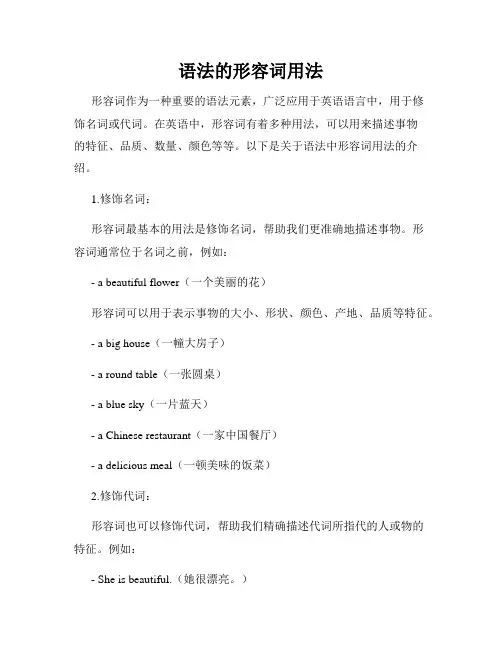
语法的形容词用法形容词作为一种重要的语法元素,广泛应用于英语语言中,用于修饰名词或代词。
在英语中,形容词有着多种用法,可以用来描述事物的特征、品质、数量、颜色等等。
以下是关于语法中形容词用法的介绍。
1.修饰名词:形容词最基本的用法是修饰名词,帮助我们更准确地描述事物。
形容词通常位于名词之前,例如:- a beautiful flower(一个美丽的花)形容词可以用于表示事物的大小、形状、颜色、产地、品质等特征。
- a big house(一幢大房子)- a round table(一张圆桌)- a blue sky(一片蓝天)- a Chinese restaurant(一家中国餐厅)- a delicious meal(一顿美味的饭菜)2.修饰代词:形容词也可以修饰代词,帮助我们精确描述代词所指代的人或物的特征。
例如:- She is beautiful.(她很漂亮。
)- This book is interesting.(这本书很有趣。
)3.形容词性物主代词:形容词也可以用作形容词性物主代词,用于表示所属关系。
例如:- This is my car.(这是我的车。
)- Is this your pen?(这是你的钢笔吗?)4.用于比较级和最高级:形容词可以用于比较级和最高级的构造中,用来表示比较和最高程度。
比较级通常用于两个事物之间的比较,而最高级则表示三者或三者以上的最高程度。
例如:- This dress is more beautiful than that one.(这件连衣裙比那件更漂亮。
)- She is the tallest girl in the class.(她是班里个子最高的女生。
)5.修饰不定代词:形容词也可以用来修饰不定代词,帮助我们描述不明确的人或物。
例如:- I want to buy some delicious fruit.(我想买些好吃的水果。
)- Would you like any other color?(你还喜欢其他颜色吗?)6.用于感叹句:形容词可以用于感叹句中,表达对事物的赞美、惊叹或批评等感情。
高中英语语法专题形容词与必背短语高中英语语法专题形容词一、概念说明人或者事物的特征、性质或状态,常用来修饰名词或不定代词的词叫做形容词。
二、形容词在句子中的成分形容词在句子中通常可以做定语、表语、宾语补足语。
1. 形容词做定语(修饰名词或者代词)例如:The lovely hat is mine. 这个可爱的帽子是我的。
I have something important to tell you. 我有重要的事情要告诉你。
2. 形容词做表语,组成主系表结构例如:She looks young. 她看上去很年轻。
3. 形容词作宾语补足语例如:Lucy wants to make herself beautiful. Lucy想让自己变得漂亮。
三、形容词的原级、比较级、最高级1 形容词原级①与形容词原级连用的副词有:very、so、too、enough、quite等。
例如:It’s too cold to g o outside. 外面太冷了,不适合出去。
②形容词原级比较的固定搭配:肯定:A...+as+形容词原级 +as+B例如:Lucy is as clever as Jack. Lucy和Jack一样聪明。
否定:A...+not+as/so+形容词原级+as+B例如:Lucy is not as/so clever as Jack. Lucy不如Jack聪明。
表示倍数:A...+倍数+as+形容词原级+as+B例如:My room is half as big as yours. 我的房间是你房间的一半大。
My room is three times as big as yours. 我的房间是你的三倍大。
2 形容词比较级(两者比较)(1) 固定结构:A...+比较级+than+B例如:Lucy’s room is bigger than yours. Lily的房间比你的大。
The weather of Qingdao is colder than that of Zhejiang in winter. (为避免重复that表示前面提到的weather.) 冬天青岛的天气比浙江冷。
英语语法什么是形容词性短语形容词性短语(Adjectival Phrase)是一种由形容词或相当于形容词的词组构成的短语,用来修饰名词或代词,在句子中充当形容词的角色。
形容词性短语可以提供更多的描述和信息,使句子更加具体和生动。
下面我将详细介绍形容词性短语的种类、结构和用法。
形容词性短语的种类:1. 单个形容词:形容词本身可以作为一个形容词性短语,用来修饰名词或代词。
例如:a beautiful flower(一朵美丽的花)。
2. 形容词短语:由一个或多个形容词组成的短语,用来修饰名词或代词。
例如:a tall, handsome man(一个高大、英俊的男人)。
3. 名词+ 形容词结构:由一个名词和一个形容词构成的短语,用来修饰名词或代词。
例如:a city park(城市公园)。
4. 介词短语:由介词和一个名词或代词构成的短语,用来修饰名词或代词。
例如:a book on the table(桌子上的书)。
5. 不定式短语:由动词不定式和一个名词或代词构成的短语,用来修饰名词或代词。
例如:a person to trust(一个值得信任的人)。
形容词性短语的结构:形容词性短语的结构可以是简单的形容词,也可以是包含其他词类的短语。
其中,形容词性短语可以由以下成分构成:1. 形容词:例如:happy, tall, beautiful。
2. 副词:例如:very, quite, extremely。
3. 名词:例如:a city, the sky, my friend。
4. 介词:例如:on the table, in the park, with a smile。
5. 不定式:例如:to learn, to explore, to see。
6. 从句:例如:that is interesting, who is kind。
形容词性短语的用法:形容词性短语通常用于修饰名词或代词,起到描述和限定的作用。
小学英语语法--形容词形容词是英语中的一类词性,用来描述名词的特征或状态。
在小学英语研究中,形容词的掌握对于学生的语言表达能力和理解能力起到关键作用。
形容词的一些基本特点包括:1.形容词的作用:形容词可以用来描述名词的外貌、颜色、大小、形状、数量、年龄等特征。
2.形容词的位置:一般情况下,形容词放在名词之前进行修饰,如:a big dog(一只大狗)。
但要注意,有些形容词可以放在名词之后,如:the day is sunny(天气晴朗)。
3.形容词的变化:形容词有三种基本变化形式:原级(如:big),比较级(如:bigger),最高级(如:biggest)。
比较级和最高级的变化规则需要根据不同的形容词进行研究和记忆。
4.形容词的修饰范围:形容词不仅可以修饰单个名词,还可以修饰整个句子或一段话。
例如:It is a beautiful day(今天天气很美)。
学生在研究形容词时,可以进行以下练和活动:1.词语排序:让学生根据形容词的大小、颜色、形状等特征进行排序,并进行正确的语法填空。
2.描述物品:让学生用适当的形容词来描述给定的物品,提高他们的描述能力和选择合适形容词的能力。
3.形容词对比:教师可给学生提供不同形容词的例句,让他们观察并比较形容词之间的差异。
4.创造句子:让学生以给定的形容词为起点,创造出有意义的句子,培养他们的语言表达能力和创造力。
通过以上活动和练,学生能够加深对形容词的理解,掌握形容词的用法,并在语言表达中更加准确和丰富。
(以上仅为简要介绍,具体内容可以根据实际情况进行拓展。
)参考资料:- ___.(2015)。
小学英语:阳光少儿英语(一年级~六年级)。
北京:人民出版社.以上是关于小学英语语法中的形容词的简要介绍,形容词对于学生的语言表达和理解能力非常重要。
可以通过一系列练习和活动来帮助学生掌握形容词的用法和变化规则,提高他们的语言表达能力。
具体的练习和活动可以根据实际情况进行拓展。
形容词是英语中的一种语法,它们用来描述名词或代词的性质或特征。
在语法结构中,形容词通常放在名词之前,用来修饰或描述该名词。
以下是一些形容词的语法规则:
1.形容词的位置:在英语中,形容词通常放在名词之前。
例如,“a
red apple”(一个红色的苹果)。
2.比较级:形容词有比较级和最高级形式,用于表达比较和程度。
比较级表示“更”的意思,最高级表示“最”的意思。
例如,“a taller person”(一个更高的人)和“the tallest person”(最高的人)。
3.否定形式:大多数形容词有否定形式,通常是在形容词前面加上
“not”。
例如,“not happy”(不高兴)。
4.修饰语:有时候,一个名词可能由多个形容词修饰,这些形容词
的顺序通常为:限定词(如a/an/the/this/that)+形状(如big/small/long/short)+颜色(如red/green/blue)+来源(如Chinese/American)+材质(如wooden/silk)+名词。
例如,“a small round table”(一张小圆桌)。
5.可数和不可数名词:有些名词是可数的,有些是不可数的。
可数
名词可以用数量来描述,而不可数名词则不能。
在描述不可数名词时,通常需要在名词和形容词之间加上一些词语,如“some”、“much”、“a lot of”等。
例如,“some milk”(一些牛奶)。
以上是形容词的语法规则,它们在英语中扮演着重要的角色,可以让人们更加准确地表达自己的意思。
英语语法形容词短语有哪些常见的类型形容词短语可以根据其结构和意义的不同,分为多种类型。
以下是一些常见的形容词短语类型:1. 单个形容词:最简单的形容词短语就是由一个形容词构成的,用来描述名词或代词的特征或性质。
例如:- a beautiful flower(一个美丽的花)- an interesting book(一本有趣的书)2. 形容词短语链:形容词短语链是由多个形容词组合而成的短语,用来进一步描述名词或代词的特征。
形容词短语链通常用逗号或连词连接形容词。
例如:- a tall, handsome, and intelligent man(一个高大、帅气、聪明的男人)- a delicious, mouthwatering, and aromatic dish(一道美味、令人垂涎、香气四溢的菜肴)3. 形容词短语前置:形容词短语可以位于名词的前面,用来修饰名词的特征。
这种形容词短语常常由介词短语或不定式短语组成。
例如:- a girl with long, curly hair(一个长发卷曲的女孩)- a man of great courage(一个非常勇敢的人)4. 形容词短语后置:形容词短语可以位于名词的后面,用来修饰名词的特征。
这种形容词短语通常由介词短语或从句组成。
例如:- a book written by a famous author(一本由著名作者写的书)- a city known for its rich history(一个以丰富历史闻名的城市)5. 形容词短语作表语:形容词短语可以作为表语,用来描述主语的特征或状态。
例如:- The weather is sunny and warm.(天气晴朗温暖)- She is happy with her new job.(她对新工作感到满意)6. 形容词短语作定语:形容词短语可以作为定语,修饰名词或代词,进一步限定名词的意义。
英语形容词总结归纳英语形容词是英语语法中的一个基本部分,它可以对名词、代词、数词等进行形容、修饰,使其更加精准地表达出来。
在英语中,形容词主要分为以下几类:性质形容词、颜色形容词、大小形容词、形状形容词、时间形容词、情感形容词、身体部位形容词、国家地理形容词等。
本文将对这些形容词进行详细的归纳总结。
一、性质形容词性质形容词主要用来形容事物的性质或状态,如good(好的)、bad(坏的)、happy(快乐的)、sad(悲伤的)、clean(干净的)、dirty(肮脏的)等。
这类形容词可以用于名词、代词、数词等的修饰,起到更加准确地描述事物的功效。
例如:1. He is a good student.(他是一个好学生。
)2. The food was so bad that I couldn't eat it.(这个食物太糟糕了,我不能吃。
)3. She was happy to see her old friend again.(她很高兴能再次见到她的老朋友。
)4. He was sad because his dog died.(他的狗死了,他很难过。
)5. The house was clean after she finished cleaning it.(她打扫过后,房子很干净。
)6. His hands were dirty after he worked in the garden.(他在花园里工作后,他的手很脏。
)二、颜色形容词颜色形容词主要用来描述事物的颜色,如red(红色的)、blue(蓝色的)、green (绿色的)、yellow(黄色的)等。
这些形容词在修饰名词时起到了更加准确地描述事物颜色的作用。
例如:1. She wore a red dress to the party.(她穿了一件红色的裙子去参加聚会。
)2. The sky was blue and clear.(天空蓝蓝的,很清晰。
英语语法—形容词
形容词[adjective] 很多语言中均有的主要词类中的一种。
主要用来修饰名词的词,表示事物的特征。
形容词的定义和用法:
形容词用来修饰名词或代词, 表示人或事物的性质, 状态,和特征。
形容词在句中作定语, 表语, 宾语,补语。
She is a good student, and she works hard.
她是一个好学生,她学习努力。
This bike is expensive.
这辆自行车很贵。
I am sorry, I'm busy now.
对不起,我现在很忙。
Have you got everything ready for the meeting?
你为这次会议做好准备吗?
形容词在句中的位置:
形容词作定语一般放在被修饰的名词之前。
如果有两个或两个以上的形容词修饰一个名词时, 则由它们和被修饰的名词之间的密切程度而定, 越密切的形容词越靠近名词。
如果几个形容词的密切程度差不多则按音节少的形容词放在前面, 音节多的形容词放在后面。
英语单词中,something, anything, nothing 等不定代词被形容词修饰时,形容词放在名词后面。
I have something important to tell you.
我有重要的事要告诉你。
Is there anything interesting in the film.
电影里有什么有趣的内容吗?
这儿一点都不危险。
由两个或两个以上的词组成的形容词词组修饰名词时须放在名词之后。
This is the book easy to read.
这是一本容易读的书。
用and 或or 连接起来的两个形容词作定语时一般把它们放在被修饰的名词后面。
起进一步解释的作用。
Everybody, man and woman, old and young, should attend the meeting.
每一个人,男女老少,都应该参加会议。
You can take any box away, big or small.
这些箱子,不管大小,你都可以拿走。
形容词的比较级和最高级:
绝大多数形容词有三种形式,原级,比较级和最高级, 以表示形容词说明的性质在程度上的不同。
形容词的原级: 形容词的原级形式就是词典中出现的形容词的原形。
例如:
poor tall great glad bad
形容词的比较级和最高级: 形容词的比较级和最高级形式是在形容词的原级形式的基础上变化的。
分为规则变化和不规则变化。
规则变化如下:
1) 单音节形容词的比较级和最高级形式是在词尾加-er 和-est 构成。
great (原级) greater(比较级) greatest(最高级)
2) 以-e 结尾的单音节形容词的比较级和最高级是在词尾加-r 和-st 构成。
wide (原级) wider (比较级) widest (最高级)
3)少数以-y, -er, -ow, -ble结尾的双音节形容词的比较级和最高级是在词尾加-er 和-est 构成。
4) 以-y 结尾,但-y 前是辅音字母的形容词的比较级和最高级是把-y 去掉,加上-ier 和-est 构成.
happy (原形) happier (比较级) happiest (最高级)
5) 以一个辅音字母结尾其前面的元音字母发短元音的形容词的比较级和最高级是双写该辅音字母然后再加-er和-est。
big (原级) bigger (比较级) biggest (最高级)
6) 双音节和多音节形容词的比较级和最高级需用more 和most 加在形容词前面来构成。
beautiful (原级)? difficult (原级)
more beautiful (比较级) more difficult (比较级)
most beautiful (最高级) most difficult (最高级)
常用的不规则变化的形容词的比较级和最高级:
原级比较级最高级
good better best
many more most
much more most
bad worse worst
little less least
ill worse worst
far farther(further) farthest(furthest)
形容词前如加less 和lest 则表示"较不"和"最不"
important 重要
less important 较不重要
lest important 最不重要
形容词比较级的用法:
形容词的比较级用于两个人或事物的比较,其结构形式如下:
主语+谓语(系动词)+ 形容词比较级+than+ 对比成分。
也就是, 含有形容词比较级的主句+than+从句。
注意从句常常省去意义上和主句相同的部分, 而只剩下对比的成分。
Our teacher is taller than we are.
我们老师的个子比我们的高。
It is warmer today than it was yesterday.
今天的天气比昨天暖和。
This picture is more beautiful than that one.
这张照片比那张照片漂亮。
This meeting is less important than that one.
这次会议不如那次会议重要。
The sun is much bigger than the moon.
太阳比月亮大得多。
形容词最高级的用法:
形容词最高级用于两个以上的人和物进行比较, 其结构形式为:
主语+谓语(系动词)+the+形容词最高级+名词+表示范围的短语或从句。
She is the best student in her class.
她是班上最好的学生。
Shanghai is one of the biggest cities in China.
上海是中国最大城市之一。
This is the biggest apple I have ever met.
这是我见到的最大的苹果。
Tom is the tallest boy in his basketball team.
汤姆是他们篮球队中个子最高的孩子。
有关形容词的几个特殊用法:
most 同形容词连用而不用the,表示"极,很,非常, 十分"。
It's most dangerous to be here.
在这儿太危险。
I cannot do it, it's most difficult.
我干不了这件事,太难了。
"The+形容词比较级..., the+形容词比较级..."表示" 越... 就越..."。
The more you study, the more you know.
你学的越多, 就知道的越多。
The more I have, the more I want.
我越有就越想要有。
The more, the better.
越多越好。
" 形容词比较级+ and + 形容词比较级", 表示" 越来越... "。
It's getting hotter and hotter.
天气越来越热了.
It's pity he is getting poorer and poorer.
真可怜他越来越穷了。
The computer is cheaper and cheaper.
计算机越来越便宜。
The more and more people focus on the meeting next year.
越来越多的人关注明年的会议。
主语+谓语(系动词)+as+形容词原形+as+从句。
表示两者对比相同。
This box is as big as mine.
这个盒子和我的一样大。
This coat is as cheap as that one.
这件衣服同那件衣服一样便宜。
I study English as hard as my brother.
我同我兄弟一样学习努力。
the + 形容词表示某种人。
He always helps the poor.
他经常帮助穷人。
I like to have a talk with the young.
我喜欢同年轻人谈话。
The rich sometimes complain their empty life.
富人有时抱怨他们空虚的生活。
The police led the old man across the street.
警察领老人横过马路。